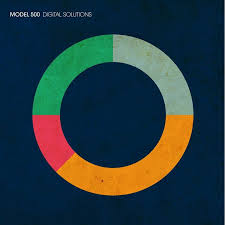Amidst a general return to techno worldwide and specifically an upsurge in the career of the Detroit artists that founded the movement, 2015 seems a particularly apt time for the return of Model 500. Of all of the original Detroit figures, Juan Atkins is quite likely the most influential, starting off with Cybotron in the earliest days of the 1980s to and moving by 1985 to his first solo works as Model 500, which became the most important touchstones for what came afterwards. Atkins’ pioneering early sound preceded other recorded efforts by his peers, and, working together, they created the most basic foundations of techno. Atkins continued doing electro as Model 500 well into the four-to-the-floor era and returned to it regularly throughout his career, but it became increasingly formless and experimental even as the purist techno of his Infiniti project rose to prominence in the mid 1990s. Like many of his Detroit peers, he mostly fell silent in the early 2000s as European minimal became the order of the day, a victim of changing times, but re-evaluation of his work from 1985-2000 in reinforces the idea that Atkins has remained one of the most distinctive of even these seminal figures in his varying guises.
Since his 2008 return, there hasn’t been a lot of music released: smattering of 12"s mostly as Model 500, and, more significantly, the 2013 Borderland album he recorded with Moritz von Oswald as a reunion for the two legends that reunited them without explicitly revisiting their previous work. Apart from the earliest, stark electro tracks of Model 500, Atkins’ sound had always been one of the more thickly melodic and textured of the Detroit figures, and his latter-day work including the 2013 album has retained this focus on atmosphere and musicality while mellowing some of the aggression and bizarre touches of his 1990s heyday. Borderland was sedate almost to a fault, the long pieces blurring together in hazy washes of dub, but there remained a clear Detroit feeling underlying its more extroverted moments. Digital Solutions – his most significant statement in over a decade – necessitates a different approach, and the results show him ageing gracefully while keeping much that distinguished him from the beginning.
Starting directly from its title, the almost-quaint sounding Digital Solutions, Atkins hasn’t set out to break new boundaries, if he ever knew what boundaries were to begin with. Radical new statements of intent are rare for an artist his age, but he also defined many of the limits himself, and as such the album touches on many things he’s visited before without staying in one place for long. Mad Mike offers production assistance on three electro jams: ‘Electric Night’ and ‘Standing In Tomorrow’ both feature vocals and are amongst the more dated pieces, although the second is also one of the strongest tracks, while the guitar-driven ‘The Groove’, recalls more or less fondly a modernised, guitar-heavy Cybotron track. Taking after its own title, the album occasionally also comes off as quaint, most particularly on the title track and ‘Hi NRG’ and in the lyrical concerns of the vocals, but there’s plenty to hold onto even if there are few outright surprises.
At its best, like on the distinctly dubbed out ‘Storm’ the Atkins that made waves in the early era remains a force to be reckoned with, very much with his own distinctive voice. It utilises bizarrely exaggerated filters on the drums and a bassline obviously of Motown origins, but the wavering synthesiser parts in its first half also come characteristically from Infiniti, and overall it includes quite a noticeably large number of parts and musical changes, characteristic of older techno and rave music. Atkins hasn’t been hiding from more modern developments either, as revealed by the rhythmic structure and bass styles on the dubstep-influenced Encounter, but it’s telling that the track’s most affecting passages come in its second half when orchestral stabs and layers of melodic keyboards bring a distinctly Detroit beauty to it that connects it to his earlier work. ‘Control’, the album’s longest piece, also stands out: it’s a production-heavy electro techno effort again featuring vocals, but thickly processed and tied to an uptempo beat. The results recall the franticness of his best work and likewise still sound vital, with a deep interest in texture, musical content, and melody that characterises Atkins’ most lasting tracks.
It’s rather too easy to criticise new work from a legendary musician not outshining past accomplishments, but attempting to use that line of argument in considering Digital Solutions is problematic. Detroit techno, even at its most bizarre – Terrence Dixon for instance, whose early Population One releases importantly appeared on Atkins’ Metroplex label – has always remained instantly recognisable over its existence if one pays attention to stylistic details. Compared to his peers, many who are making victory laps rather than recording new music, it’s fairly clear Magic Juan still has his magic and hasn’t turned conservative or completely predictable. Apart from a few slow moments, the album is overall a heartfelt and thoughtful piece, well composed and sequenced from beginning to end, and it sometimes approaches his best work.
In a genre that Atkins helped build for a very important first half, 30 years later it’s remarkable that his music is relevant at all. A 2015 update of Model 500 with a dark, industrial overcoat would be as unbearable as similarly ill-considered evolutions from other artists, and in sticking to his ground Atkins resolutely retains his strengths.
<div class="fb-comments" data-href="http://thequietus.com/articles/17379-model-500-digital-solutions-review” data-width="550">


